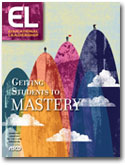Struggle Builds Strength
I was challenged by math throughout middle and high school. I sometimes had to put in long hours striving to understand new concepts. Part of the problem was that as the daughter of a soldier, I had to change schools often. During my 8th grade year, I even had to leave our overseas home for four months because of political unrest. The school I attended temporarily during this period did not even offer the algebra class I had been taking, but I was determined not to fall behind.
Truth be told, constantly changing schools forced me to acclimate to different teaching styles and expectations, and those four months trying to learn algebra without a class taught me to be an independent learner. I eventually majored in mathematics and became a math teacher, but I had to put in extra hours of study the entire way. Now I can truthfully tell my struggling math students that I, too, struggled—and if they work hard, they too can succeed.
—Robyn Wise, middle school coordinator and math teacher, The Fourth Presbyterian School, Potomac, Maryland
A Second Try
I had the same fabulous math teacher for four years in high school, and I absolutely loved math. I finished my senior year with a trigonometry/ precalculus class and headed off to college, determined to become a mathematics teacher. On the basis of my transcripts, I was advised to take Calculus 1. After the first two weeks, I still had no clue what I was doing. I felt as though I were taking a foreign language, and I was in tears almost every night because my dream of being a math teacher appeared to be unrealistic. As a result of my failure, I was transferred to precalculus.
My sophomore year, with apprehension, I signed up for Calculus 1 again. Two weeks in, it was as though a light went on. I eventually completed Calculus 2 and 3, became a mathematics teacher, and loved my job. On occasion, over 14 years, I would share my story to inspire students who either hated math or struggled to understand it. Success in mathematics is about building on a sound foundation. It doesn't matter whether the class you're taking is "advanced" or not. It's about perseverance!
—Melanie Mueller, director of research, assessment, and evaluation, Papillion-La Vista School District, Papillion, Nebraska
The Oldest—and Most Determined—In the Class
My wife convinced me to go back to college and complete my master's degree in education. I chose a small college 90 miles from my home, enrolled in an accelerated program, and began commuting. It had been 16 years since I wrote a paper, and the first couple I wrote were awful. Studying was another problem—I hadn't used that part of my brain in quite a while. The whole time, I was thinking "This is crazy; I am the oldest person in the program!" But after about three months I began to get into the swing of things. I would stay at school, either in the computer lab or library, completing all my work every day before the long drive home. I would have my wife read my notes on an audiotape that I listened to on the drive to school. I had to retrain myself to take notes and figure out what I needed to know for each class. When we had a break in class I would run up and down the stairs to reenergize myself. The whole time my wife kept saying, "You can do it—just think of all you are going to accomplish when you're finished." After a year and a semester, I did. Two years later I went for my EdS degree.
—Michael Grimmer, principal, Gaston County Schools, Gastonia, North Carolina
A Mom and a Teacher
In 5th grade, I began to struggle in school because I did not understand how to study or to comprehend what I was reading. My learning had all been rote learning. I did not want to get failing grades or even Cs. What helped me succeed? First, my mom took time to teach me how to outline and study; I outlined every social studies and history text in 5th and 6th grade. Another influence was my 6th grade teacher, who encouraged me to spend time after school in her classroom. The lessons she taught me made me a success ful student and, eventually, a successful teacher.
—Pat Bove, retired music teacher, Tredyffrin-Easttown School District, Wayne, Pennsylvania
Just Ask for Help
I am an "old" technology user in both senses of the word. I first taught computers when there was no software, just programming in BASIC. I knew how to do everything in an old DOS coding system. Then I bought a Macintosh and struggled for two days to figure out how to copy a file from one location to another. My 12-year-old daughter walked into my office and said, "Just drag the file to the new location." The lesson for tackling un familiar technology? Don't struggle too long, and don't give up—just ask for help. A little outside support can help you succeed.
—Karin Wiburg, professor, learning technologies, New Mexico State University, Las Cruces
I Haven't Succeeded—Yet
After succeeding as a competitive cyclist and runner, I thought the next step would be to learn to swim and grow into a triathlete. I had feared swimming—especially open-water swimming—ever since I was a boy, but I thought I was ready to succeed. After reading some books on technique, I attempted on my own but failed. I took adult swim classes to learn to race, and again I failed. I scheduled three days a week to focus on swimming, and I failed for a third time. I haven't yet completely pushed through the fear and lack of skill, and the goal is again on long-term pause. But my perseverance hasn't ended—I remain motivated to try again because regret pushes harder than fear of failure pulls.
—Bob Dillon, director of technology and innovation, Affton School District, Affton, Missouri
Exemplars Lead the Way
Grad school, 2000. The class: Photoshop 6. The assignment: Design a menu. The process: Learn the program through online tutorials. Thirteen years ago, tutorials were not the normal learning platform, and Photoshop layers felt like a foreign language. What motivated me to persevere was my own desire to learn and conquer the challenge. And exemplars were my guide. The more I researched what professional photographic designers produced, the harder I worked to learn what was excellent and effective. After this class, I went on to take video production and experienced a similar process when learning video editing and then later when learning Dreamweaver. Exemplars and grit provided me with rich, powerful learning experiences.
—Susan Maynor, enrichment teacher, Crossroads Academy, Kansas City, Missouri
Working My Way Back
I lost my dream job in New York City as a result of 9/11, and I knew I was going to have to find a way to psychologically rebuild myself. Crowds made me uneasy. Little things like looking for my credit card in the grocery store line made me panic. Yet I knew that many people were struggling with much larger challenges than I was. At the age of 50, I decided that going to graduate school would be the best way to distract myself, so I registered for a full 12-credit load. The dean was unsure of the wisdom in this, but I explained I was determined to get back on my feet. Concentrating was hard, and I was clearly the oldest in my classes. But my determination and family support were my greatest strengths. I graduated with a 3.8 grade point average. I have returned to teaching, my first love, and went on to get another master's degree in administration. Now I'm looking forward to becoming a school leader.
—Christine Duane, teacher, Monroe Township Board of Education, New Jersey

